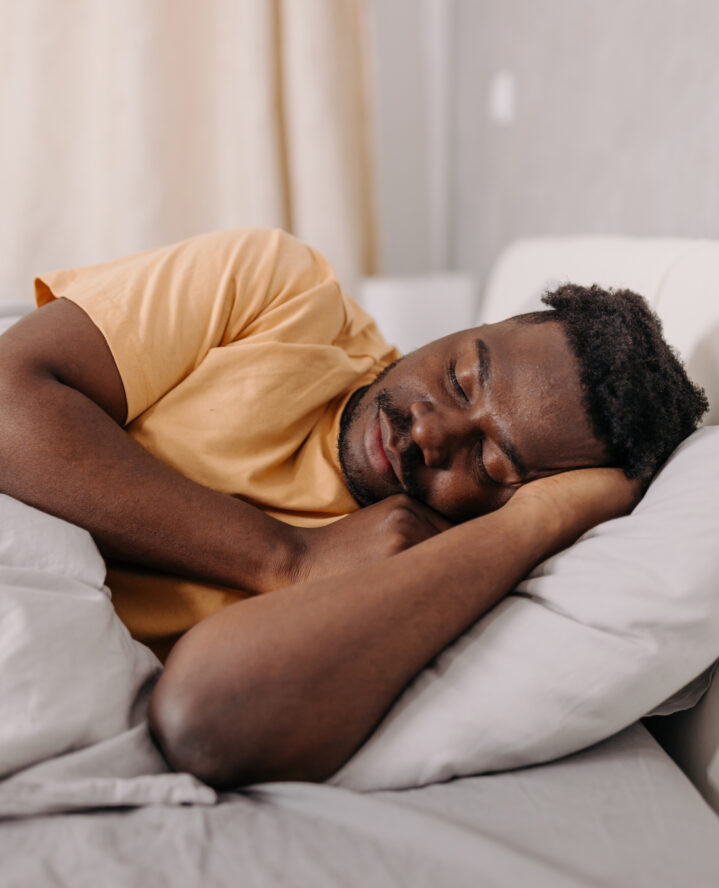Ever wonder why we sleep? Regardless of your age, sleep is an important part of life. REM sleep, especially, is important to overall body and brain functions. So, how much REM sleep do you need?
Good Sleep Equals a Healthy Body
Good sleep means improved brain performance, mood, and overall health. Imagine not getting adequate sleep for even two days. You will feel tired and worn out. You might have some persistent headaches and constant fatigue. This is a clear indication that your body needs some rest through sleep.
It is during sleep that our nerve cells communicate with each other. Recent studies even suggest that neural pathways and bridges are restored and strengthened during our sleep time. In turn, lack of good sleep regularly puts you at risk for many health risks, including heart disease, obesity, and dementia.
And this is precisely where the importance of REM sleep comes in.
REM Sleep
Rapid eye movement (REM) sleep is a stage the brain undergoes during the sleep cycle. This stage of sleep is mainly associated with dreaming and memory consolidation. A series of physiological changes in the body mark REM sleep. This includes eye movement that can be rapid, especially when you are dreaming, muscle relaxation, and increased brain activity.
Signs of REM Sleep
During REM sleep, your body and brain undergo several changes. Some notable signs of REM sleep include:
- Body temperature changes
- Rapid eye movement
- Sexual arousal
- Increased heart rate
- Increased blood pressure
Why REM Sleep Is Important
Sleep is important for everyone. Having enough sleep every day improves your well-being and makes you feel fresh. Of all sleep, REM sleep plays an essential role in dreaming, memory, emotional processing, and healthy brain development. Here is some of the importance of REM sleep:
Dreaming
If you did not know, most of our dreams occur during the REM sleep stage. Remember, there are different stages of sleep. Even though dreaming can take place in and at various stages of sleeping, it is during REM sleep that people. tend to have the most vivid dreams.
Emotional Processing
REM sleep also plays an important role in emotional processing. After that wonderful or not-so-good day you have experienced, having a good sleep will help your brain process emotions during REM sleep. In other words, REM sleep is the time when your brain may decompress by processing and compartmentalizing thoughts and events from the day. Thus, having a night of inadequate sleep can lead to decreased emotional memory consolidation.
Brain Development
Studies have suggested REM sleep plays an important role in brain development since infants spend most of their sleep time in REM. This is attributed to the brain’s high activity levels, which help to develop and strengthen neural connections.
Sleep Disorders That Affect REM Sleep
Several sleep disorders can affect your REM sleep. Sleep disorders can make it difficult for you to have good sleep. Seeking medical assistance from a therapist can help improve your sleep quality. These sleep disorders include:
- Sleep apnea
- Insomnia
- REM sleep behavior disorder (RBD)
- Narcolepsy
How much REM sleep do you need?
While it is not yet established how much REM sleep you need, this stage of sleep is important for dreaming and helps you process emotions. Infants need the most REM sleep when their brains are still developing. Newborns usually spend 8 hours of REM sleep each day, while adults have about 2 hours of REM sleep each night. As time progresses, your body alters your sleep duration and even sleep pattern depending on your lifestyle. Therefore, your REM sleep can vary based on your body’s needs.
How To Get More REM Sleep
Inadequate sleep can put you at risk of diseases and disorders affecting your well-being. Undiagnosed sleep disorders and insomnia can lead to a lack of REM sleep, seriously impacting your life and overall health. Good sleep is crucial for our bodies and minds. Without it, we can face difficulties concentrating in classrooms, workplaces, or other places. Here are a few ways to get more REM sleep:
Get regular exercise.
Doing exercise for about 30 minutes daily can help you get more REM sleep. Exercising helps to raise your body temperature, and when the body temperature starts to fall, the decline helps to facilitate sleepiness.
Develop a sleep schedule.
You might have different sleep and wake times depending on your schedules. This can interfere with REM sleep. To get more REM sleep, you must have a sleep schedule. Ensure you go to bed and wake up at the same time every day.
Do not take alcohol, caffeine, or cigarettes.
These are stimulants that can interfere with your sleep. Taking alcohol before bed can delay when you first enter REM sleep.
Treat sleep disorders.
Sleep disorders such as insomnia or sleep apnea can affect your REM sleep. If a sleep disorder causes REM sleep disruptions, it would be wise to treat the disorder, which can lead to a gradual return to normal proportions of REM sleep.
More Tips for Better Sleep
- Manage mental health issues. If mental health conditions such as anxiety or depression affect your sleep, seek medical assistance. Managing these conditions can help improve your sleep quality. When you cannot manage mental health conditions, seeking professional assistance from a therapist can help overcome negative thought patterns to improve sleep quality.
- Keep electronics away. Phones and other electronic devices can affect your sleep. These devices emit blue light, which plays a role in disrupting your natural sleep pattern. Also, these devices are addictive, so you will likely use them for more hours, affecting your sleep cycle. Keep electronic devices away from your bedroom to ensure you get quality sleep.
- Get enough sleep. Getting at least 7 hours of sleep can help with REM sleep. Less sleep than recommended reduces the number of REM sleep phases you experience.
- Bedroom plants. Bedroom plants can help reduce stress levels and improve sleep quality, besides adding natural beauty to your bedroom.
Having adequate sleep is an important part of our human development. And it is through this that REM sleep is associated with dreaming, emotion processing, and memory consolidation. Lack of good sleep can lead to many diseases and disorders that affect your sleep part and sleep quality. If other mental health issues affect your sleep, seek medical assistance from your therapist.
popular posts
- 1It’s Black Business Month, So Let’s Go Shopping and #BuyBlack!
- 2These Home Decor Items Will Instantly Make Your Space Look Outdated
- 3Black-Owned Home Decor Stores To Support Across the United States
- 4A Look Inside Elon Musk's Tiny $50,000 House
- 57 Black and Multicultural Designers To Follow For Design Inspo
Bedroom
FOLLOW ALONG ON INSTAGRAM
#homeandtexture
Find us on social for more home inspiration where culture, personal style, and sophisticated shopping intersect to help you create a home where you love to live.




